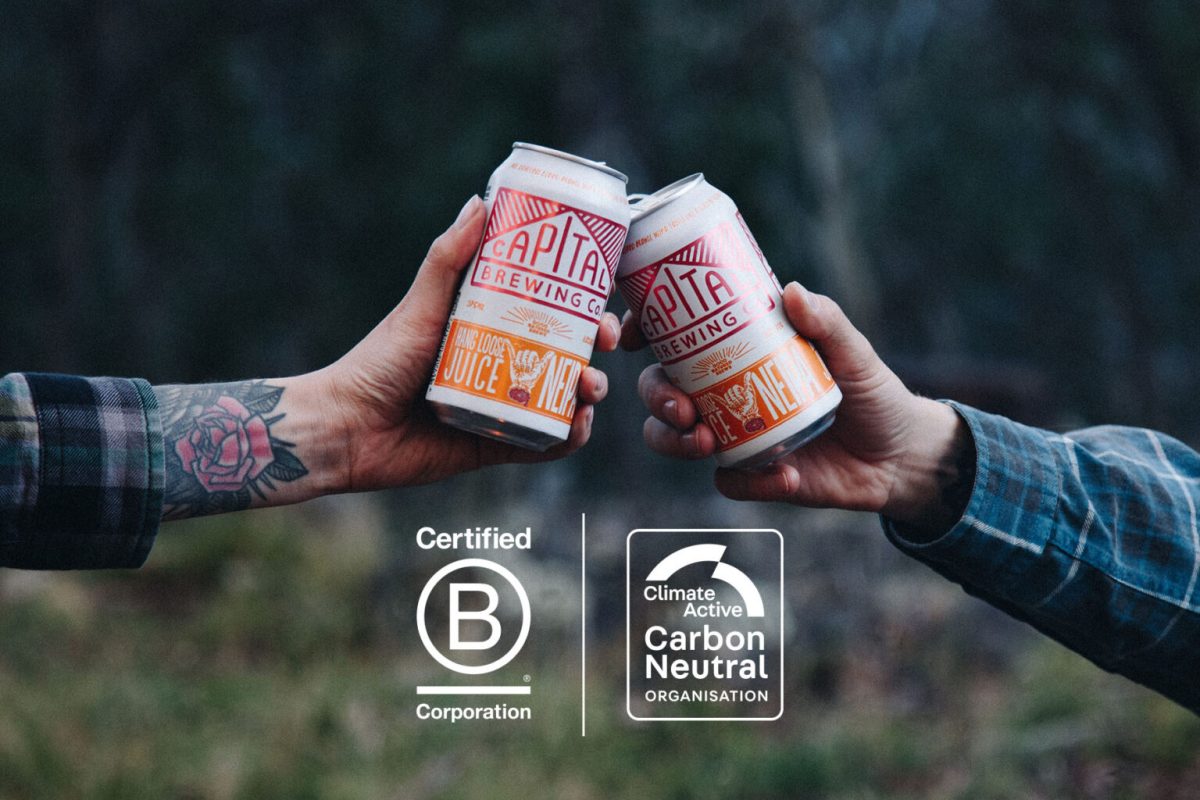Located in the ACT, Capital Brewing Co is Australia’s first brewery to become B Corp certified and certified carbon neutral.
Laurence Kain, Capital Brewing’s Managing Director spoke to National Liquor News about the importance of environmental, social, and governance (ESG) responsibility within the business.
“It starts with our B Corp certification, which is one of the hardest, most rigorous ESG certifications to obtain globally. It audits the entire business across three main pillars, which is people, planet and purpose, and looks into how we’re operating in those three areas,” says Kain.
B Corp certification was a goal for Capital Brewing from the brewery’s beginnings.
As Kain continues: “Even before day one, we were looking into B Corp and trying to understand what was involved, [but] when you start a business and you’re bootstrapping it, you don’t really have the resources to engage with stuff like that. What we were doing was, as we were setting up and establishing ourselves, we were setting up with the principles of B Corp. When it came to certification, it probably took us six months, but we’d been working the business towards it for five years.”
Some of the sustainable practices enacted at Capital include turning brewing waste into compost.
Kain says: “We saw that we had a lot of yeast and a lot of hop matter that was going down the drain and worked out that we could sidestream that liquid waste and provide it to an organic compost farm that operates nearby. They take all of our spent grain and feed it to the organic cattle herd and they take about seven tonnes a week of our liquid sludge waste from yeast and hops, and they turn that into organic compost.”
The brewery also partners with Goterra to repurpose food waste coming from the taproom.
“We are licensed for just under 1,000 people. On a busy day we’ll do close to 2,000 covers of food, so obviously there’s a lot of food waste off the floor. Food is a huge problem because it creates a lot of methane emissions when it’s in landfill. [Goterra is] feeding it to the black soldier fly larvae, which prevent those methane emissions from being created. The black soldier fly larvae eat it and then are sold on as a protein source to livestock farms,” says Kain.
Another innovative sustainability initiative at Capital is its bespoke refrigeration system, as Kain explains: “We were lucky enough to get a federally funded grant that provided 25 per cent of the funding to upgrade our refrigeration system to a really energy efficient, water cooled system. This was specifically designed by refrigeration engineers for our climate here in Canberra, rather than just using a traditional off the shelf air cooled system, which doesn’t operate very efficiently when it’s hot. In Canberra, we get a lot of minus temperatures and we get a lot of really hot summer days. This plant was designed specifically to operate efficiently in our climate, so we’ve seen a big uplift in refrigeration capacity, but a reduction in overall energy consumption.”
Accurate measuring and honest reporting are important to Capital’s introduction of environmentally sustainable practices.
“We have a working group on what we call environmental impact and controllable costs. Every week we’re measuring all of these different elements around our brewery of wastage, water consumption and utility consumption, tracking week on week on how performances are looking. […] We’ve developed a philosophy, which is that the first step is measuring quality, putting in place initiatives and then measuring whether those initiatives actually do what you hoped they would,” says Kain.
Ensuring safe and fair working conditions are another part of B Corp certification, which Capital takes seriously.
“The certification really looks into whether you have inbuilt exploitation to your workforce, like are you having your people work regular, systematic, unpaid overtime. [Fixing this] then feeds into you being able to deliver a better margin,” Kain says
“[B Corp] goes into safety and looks at our provision of a safe workplace to our people and our safety management system. We’re in a relatively high-risk industry and manufacturing with hot liquids, chemicals, gases and steam and heavy equipment lifting. That’s really important to us in providing a safety management system to our team in a safe workplace.”
When asked about why craft brewing has made such impressive steps towards environmental sustainability, Kain attributed it to the attitudes of people within the industry.
“I think it’s the nature of the people that are in the industry. The industry is very collegial and collaborative. I think that’s just the nature of the people that you generally find within the craft brewing industry. These people care a little bit more about being more responsible in the operation of their business.”

